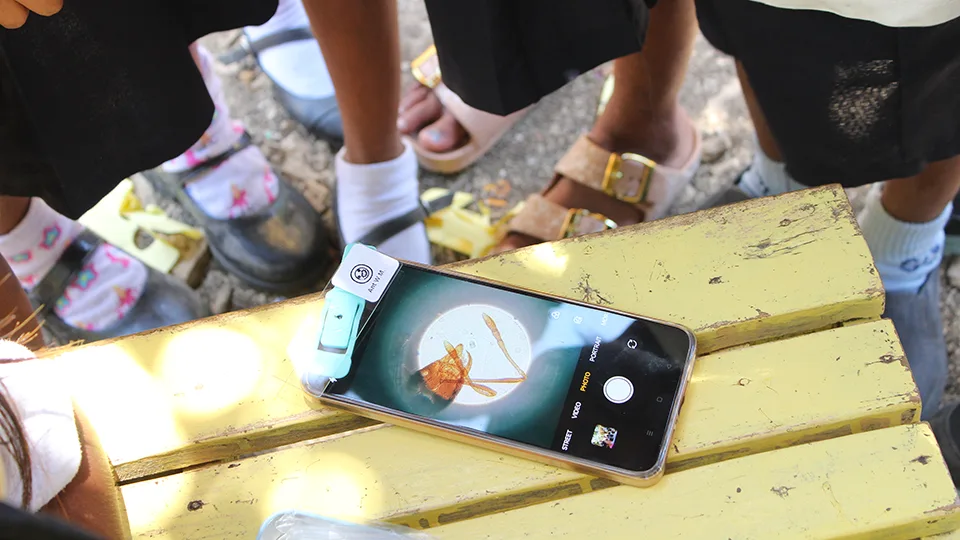Young Inventor Democratizes Science Education with Key Chain Microscope in the Philippines
The first time Jeremy De Leon looked into a microscope, in 6th grade, he had to share it with five other students with only ten minutes to satisfy his curious mind. A few years later, when the Covid-19 crisis kept students away from their schools, he invented the Make-roscope, a keychain-sized device using smartphone cameras and a magnifying lens so every student can explore science at their own leisure.

In 2020, freshly graduated from Mapua University with a bachelors in manufacturing engineering, Jeremy De Leon created his company JereMAKE "to explore my curiosity and produce some TikTok videos," he said. Then schools were closed, and social media platforms were rife with comments about the adverse effects of homeschooling on health, but also on the educational system, he explained.
Remembering his frustration at not being able to satisfy his curiosity in 6th grade and how limiting the experience, he started working on a device that would allow students to "keep their curiosity about science alive." "At least something had to be done so that students could experience the science laboratory at home." He started with his own funds and posted a TikTok video in 2022 about his prototype Make-roscope. The response was immediate, with people asking where to get the device. What started as a passion project was becoming an impactful innovation.
Winning a TikTok video competition organized with the Philippines’ Department of Science and Technology earned Jeremy US$400 to work on and commercialize the idea.
An affordable key chain microscope
Jeremy realized that he could use JereMAKE to launch different products. The first of them was the MAKE-roscope, launched in 2022.

The device is a keychain-sized tool that goes over any smartphone or tablet's front camera. The food-grade silicone Make-roscope self-adheres to the phone and has a 125-400 magnification power, half of the capacity of a regular school microscope, for one-tenth of the price. The Make-roscope kit costs around US$20.
The product was primarily designed for middle and high school students, allowing them to view a range of organisms, like nematodes, fungi, algae, and plant cells. College students also use it, for example, in medical technology because the device allows the examination of tissue and muscle structures, Jeremy explained.
Once a slide is placed over the Make-roscope, the user can view the magnified samples and take pictures or videos. It comes in a pocket-size tin box with three pipettes, three centrifuge tubes, three sample slides, one blank slide, two cotton swabs, a pair of tweezers, and an information card.
User feedback key in designing the clip-on microscope for phones
Going from his project to the final product took some hard work. Jeremy started with a 3D printer and tried several designs. He also wanted to find a material that would stick to a smartphone surface without adhesive or clips.
After the first series of Make-roscopes made from PVC, Jeremy built on user reviews and feedback and switched to silicone. He finalized his product with the help of a grant from the Department of Science and Technology.
Donations at the core of JereMAKE business model
The Make-roscope is only available in the Philippines at the moment, from the JereMAKE website or on different marketplaces. The company also sells the device to schools and foundations.

However, Jeremy wanted the innovation to benefit as many students as possible and decided that 20% of the profit would be used to donate the device to partner schools and partner organizations.
Since 2022, Jeremy has distributed 10,000 Make-roscopes, 3,000 of which were funded by the Department of Science and Technology (DOST) 's Technology Application and Promotion Institute. 8,000 Make-roscopes were sold, 1,000 of which to the Security Bank Foundation, which donated them to schools. JereMAKE donated 2,000 pieces to partner schools and organizations.

Jeremy manufactures and assembles the Make-roscope kits at home with some hired help.
As the demand grows, "I am expanding my manufacturing and assembly process by making larger molds and partnering with factories to handle thousands of orders with a lead time of one month," he explained.
An award-winning educational invention protected by IP
Jeremy is well aware of the importance of protecting his invention and name with intellectual property. JereMAKE and Make-roscope are registered trademarks in the Philippines (4/2023/00527432 and 4/2023/00527430), and a patent is pending for the Make-roscope, which is also protected with registered industrial designs (3-2021 050692 and 3-2022 050721).
As a Z-generation member and internet native, Jeremy is building his brand through TikTok, showing specimens that can be studied with the Make-roscope and insisting on the accessibility and affordability of the device.
Jeremy won the James Dyson Award 2023 for his keychain microscope.
A new range of microscopy kits
Jeremy is already considering new products, particularly developing specific microscopy educational kits for chemistry, physics, and biology. He is also considering kits for health professionals and the agricultural sector, helping farmers determine plants' health using microscopy.
In the next five years, he hopes that Make-roscope will be widely distributed to all the schools in the Philippines and beyond, and each international sale will be matched with one donation in the Philippines.



